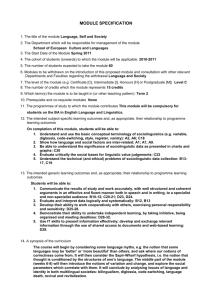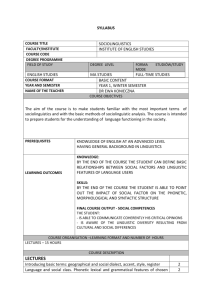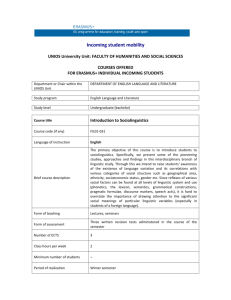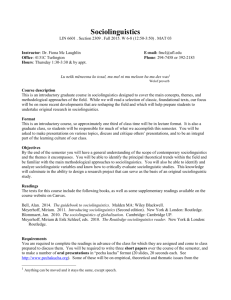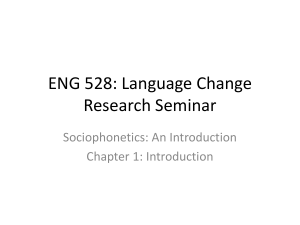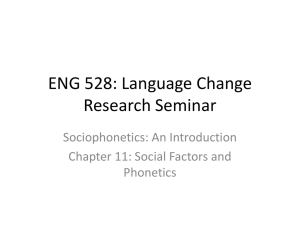APLN502-Sociolinguistics
advertisement
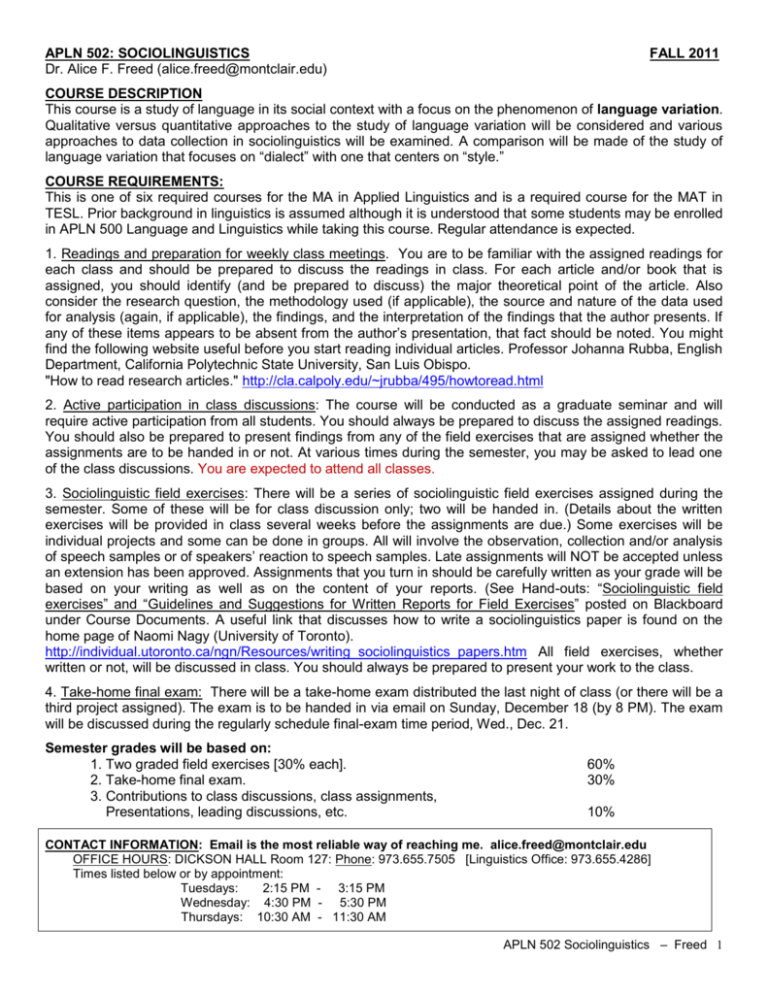
APLN 502: SOCIOLINGUISTICS Dr. Alice F. Freed (alice.freed@montclair.edu) FALL 2011 COURSE DESCRIPTION This course is a study of language in its social context with a focus on the phenomenon of language variation. Qualitative versus quantitative approaches to the study of language variation will be considered and various approaches to data collection in sociolinguistics will be examined. A comparison will be made of the study of language variation that focuses on “dialect” with one that centers on “style.” COURSE REQUIREMENTS: This is one of six required courses for the MA in Applied Linguistics and is a required course for the MAT in TESL. Prior background in linguistics is assumed although it is understood that some students may be enrolled in APLN 500 Language and Linguistics while taking this course. Regular attendance is expected. 1. Readings and preparation for weekly class meetings. You are to be familiar with the assigned readings for each class and should be prepared to discuss the readings in class. For each article and/or book that is assigned, you should identify (and be prepared to discuss) the major theoretical point of the article. Also consider the research question, the methodology used (if applicable), the source and nature of the data used for analysis (again, if applicable), the findings, and the interpretation of the findings that the author presents. If any of these items appears to be absent from the author’s presentation, that fact should be noted. You might find the following website useful before you start reading individual articles. Professor Johanna Rubba, English Department, California Polytechnic State University, San Luis Obispo. "How to read research articles." http://cla.calpoly.edu/~jrubba/495/howtoread.html 2. Active participation in class discussions: The course will be conducted as a graduate seminar and will require active participation from all students. You should always be prepared to discuss the assigned readings. You should also be prepared to present findings from any of the field exercises that are assigned whether the assignments are to be handed in or not. At various times during the semester, you may be asked to lead one of the class discussions. You are expected to attend all classes. 3. Sociolinguistic field exercises: There will be a series of sociolinguistic field exercises assigned during the semester. Some of these will be for class discussion only; two will be handed in. (Details about the written exercises will be provided in class several weeks before the assignments are due.) Some exercises will be individual projects and some can be done in groups. All will involve the observation, collection and/or analysis of speech samples or of speakers’ reaction to speech samples. Late assignments will NOT be accepted unless an extension has been approved. Assignments that you turn in should be carefully written as your grade will be based on your writing as well as on the content of your reports. (See Hand-outs: “Sociolinguistic field exercises” and “Guidelines and Suggestions for Written Reports for Field Exercises” posted on Blackboard under Course Documents. A useful link that discusses how to write a sociolinguistics paper is found on the home page of Naomi Nagy (University of Toronto). http://individual.utoronto.ca/ngn/Resources/writing_sociolinguistics_papers.htm All field exercises, whether written or not, will be discussed in class. You should always be prepared to present your work to the class. 4. Take-home final exam: There will be a take-home exam distributed the last night of class (or there will be a third project assigned). The exam is to be handed in via email on Sunday, December 18 (by 8 PM). The exam will be discussed during the regularly schedule final-exam time period, Wed., Dec. 21. Semester grades will be based on: 1. Two graded field exercises [30% each]. 2. Take-home final exam. 3. Contributions to class discussions, class assignments, Presentations, leading discussions, etc. 60% 30% 10% CONTACT INFORMATION: Email is the most reliable way of reaching me. alice.freed@montclair.edu OFFICE HOURS: DICKSON HALL Room 127: Phone: 973.655.7505 [Linguistics Office: 973.655.4286] Times listed below or by appointment: Tuesdays: 2:15 PM - 3:15 PM Wednesday: 4:30 PM - 5:30 PM Thursdays: 10:30 AM - 11:30 AM APLN 502 Sociolinguistics – Freed 1 APLN 502: SOCIOLINGUISTICS Dr. Alice F. Freed (freeda@mail.montclair.edu) FALL 2011 REQUIRED READINGS: Barbara Johnstone. 2000. Qualitative Methods in Sociolinguistics. New York: Oxford. Ronald Macaulay. 2009. Quantitative Methods in Sociolinguistics. St. Martin's Press (Palgrave). Nikolas Coupland. 2007. Style: Language Variation and Identity. Cambridge University Press. Other assigned readings will be available via Blackboard (marked as BB), from various websites, or from journals available through the library webpage (marked as Journal). For journal articles, go to Library’s home page: Click on “Articles and Databases” and then “Periodicals List” in the right-hand corner. Then type in the name of the journal. Check Blackboard a day or two before each class meeting in case there are announcements or changes to the assignments. Be sure that your Montclair State email address is working. All class emails are automatically sent to your MSU address. If you are not familiar with Blackboard, go to http://oit.montclair.edu/resources/studentbb.html SUGGESTED/ SUPPLEMENTARY TEXT FOR AN OVERVIEW OF SOCIOLINGUISTICS: Miriam Meyerhoff. 2011 Introducing Sociolinguistics. 2nd Edition. New York/London: Routledge/Taylor & Francis. [This title is available at the University bookstore.] COURSE OUTLINE: (The dates and readings below are subject to change. Please check Blackboard for updates.) Readings should be completed before the beginning of the class for which they are assigned. Wednesday, September 7: Introduction to sociolinguistics, the study of language in its social context. READINGS Patrick, Peter L. [Course materials © for/by Peter L. Patrick. Contains other copyrighted material used for educational purposes. Please respect copyright.] “Some Definitions and Divisions of Sociolinguistics.” http://courses.essex.ac.uk/lg/lg554/DefinitionsSlx.html Wednesday, September 14: Overview of Sociolinguistics READINGS: Johnstone, Barbara. 2000. Qualitative Methods in Sociolinguistics. New York: Oxford. Ch. 9. “Writing.” Pp. 130-143. Read exercise #1 from Ch. 9 (p. 142) for class discussion. Chs. 1-3. Pp. 1-38. Pay particular attention to exercise #1 from Ch. 2 (p. 17-18). Macaulay, Ronald. 2009. Quantitative Methods in Sociolinguistics. St. Martin's Press. Forward, Preface, and Ch. 1. “Social Categories.” Pp. vii-17. Eckert, Penelope. Jan. 7, 2005. Variation, convention, and social meaning. Plenary Talk for the Linguistic Society of America. Oakland, CA. http://www.stanford.edu/~eckert/EckertLSA2005.pdf Field Exercise 1: Identifying phonological variation. Wednesday, September 21: Sociolinguistics: Quantitative versus qualitative approaches READINGS: Labov, William. (2006). [First published 1972.] “The social stratification of (r) in New York City department stores.” Ch. 3 in The Social Stratification of English in New York City. [2nd Edition]. Cambridge University Press. Pp. 40-57. BB Go to: http://www.ling.upenn.edu/phonoatlas. At the bottom of the page on “Links” click on “New Yawk Talk” and listen to the NPR interview with William Labov on his 40-year study of the various accents of New York City. Patrick, Peter: “Word Lists: Rapid (and Anonymous) Elicitation.” http://courses.essex.ac.uk/lg/lg654/RapidAnonymousElicitation.rtf Maciej Baranowski Field Project: “Rapid and Anonymous Study of (r) in Philadelphia” http://www.ling.upenn.edu/courses/Summer_2002/ling102/FP1.html Johnstone, Barbara. 2000. Qualitative Methods in Sociolinguistics. New York: Oxford. Chs. 5-7. Pgs. 58-102. [Read and think about exercise #2 in Johnstone, page 101.] Field Exercise 2: Identifying a sociolinguistic variable. Wednesday, September 28: NO CLASS The study of language variation: Sociolinguistic variables. The case of -ing. The readings listed below should be done even though we won’t have class. These will be APLN 502 Sociolinguistics – Freed 2 discussed on October 5. Wednesday, September 28: READINGS: Fischer, John (1964). “Social influences on the choice of a linguistic variant.” In Dell Hymes (Ed.). Language in Culture and Society: A reader in Linguistics and Anthropology. Harper & Row: 483-488. BB Labov, William. (2006). “Other linguistic variables.” Ch. 10 in The Social Stratification of English in New York City. [2nd Edition]. Cambridge University Press. Pp. 254-261. BB Wald, B. & T. Shopen. “A researcher’s guide to the sociolinguistic variable (ING). In T. Shopen and J. Williams (Eds.). Style and Variables in English. Winthrop: 515-541. BB Wednesday. October 5: The study of language variation: language in its social context. READINGS: Peter Patrick. “Five Principles of Linguistic Style (as stated by William Labov)” http://courses.essex.ac.uk/lg/lg232/5principlesStyle.htm Wolfram, Walt. (1993). “Identifying and Interpreting Variables.” In D. Preston (Ed.). American Dialect Research. John Benjamins Publishing Co. 193-221. BB Suggested additional reading: Labov, William. (1972). “Some principles of linguistic methodology.” Language in Society. 1:97-120. BB Field Exercise 3: First written exercise due. “Analyzing a sociolinguistic variable.” Be prepared to present your findings in class. Wednesday, October 12: The study of language variation: collecting and analyzing language data. READINGS: Macaulay, Ronald. 2009. Quantitative Methods in Sociolinguistics. St. Martin's Press. Chs. 2-4. Pp. 18-52. Feagin, Crawford (2001). “Entering the Community.” In J. Chambers. P. Trudgill and N. Schilling-Estes (Eds.). The Handbook or Language Variation and Change. Blackwell. 20-39. BB Suggested additional reading: Labov, William. (1984). "Field methods of the project on linguistic change and variation." In J. Baugh and J. Sherzer (Eds.) Language in Use: Readings in Sociolinguistics. Prentice Hall. 28-53. BB Wednesday, October 19: The study of language variation: collecting and analyzing language data. READINGS: Milroy, Lesley. (1987). "Speakers: Some Issues in Data Collection." Ch. 3 of Observing and Analyzing Natural Language. Blackwell. 39-67. BB Johnstone, Barbara. 2000. Qualitative Methods in Sociolinguistics. New York: Oxford. Ch. 4. 39-57; Ch. 8. 103129. Exercise #2, page 128. Prepare this exercise for class discussion. Wednesday, October 26: Variationist Sociolinguistics: Language variation, race and social class. READINGS: Thomason, Sarah. “Language variation and change.” http://www.lsadc.org/info/ling-fields-change.cfm Guy, Greg. (1988). “Language and social class.” In F. Newmeyer (Ed.) Linguistics, the Cambridge Survey: Language: the socio-cultural context 37-63. BB. Kroch, Anthony. (1978). "Towards a theory of social dialect variation." Language in Society. 7:17-36. BB Rickford, John. (1986). "The need for new approaches to social class analysis in sociolinguistics." Language and Communication. 6.3.215-221. BB Suggested additional reading: Ash, Sharon. (2003). “Social Class.” In J. Chambers. P. Trudgill and N. Schilling-Estes (Eds.). The Handbook or Language Variation and Change. Blackwell. 402-422. BB Wednesday, November 2: Variationist Sociolinguistics: Language, social networks, and social identity. READINGS: Milroy, Lesley. (2003). "Social Networks.” In J. Chambers. P. Trudgill and N. Schilling-Estes (Eds.). The Handbook or Language Variation and Change. Blackwell. 549-572. BB Gal, Sue. (1978). "Peasant men can't get wives: Language change and sex roles in a bilingual community." Language in Society 7:1-16. BB APLN 502 Sociolinguistics – Freed 3 Wednesday, November 2: continued Suggested additional reading: Milroy, J. and L. Milroy (1992). "Social network and social class: Toward an integrated sociolinguistics model." Language in Society: 21.1.1-26. Journal. Wednesday, November 9: Language, sex and gender READINGS: Eckert, Penelope. (1989). "The whole woman: Sex and gender differences in variation." Language Variation and Change. 1:245-267. BB Dubois, Sylvie and Horvath, Barbara. (1999). “When the music changes, you change too: Gender and language change in Cajun English.” Language Variation and Change, Volume 11.3: 287-313. Journal. Holmes, Janet and Miriam Meyerhoff. (1999). “The community of practice: Theories and methodologies in language and gender research.” Language in Society. 28.2:173-183. Journal. Suggested additional reading: Macaulay, Ronald. 2009. Quantitative Methods in Sociolinguistics. St. Martin's Press. Ch. 7, Pp. 83-103. Wednesday, November 16: : Language and stylistic variation. READINGS: Patrick, Peter L. “Notes on the Sociolinguistics of Style-Shifting” http://courses.essex.ac.uk/lg/lg232/StyleNotes.html http://courses.essex.ac.uk/lg/lg232/StyleChart.html Macaulay, Ronald. 2009. Review of Nikolas Coupland’s Style. Language in Society. 38: 119-122. BB Coupland, Nikolas. 2007. Style. Cambridge University Press. Ch. 7. Pp. 177-188. Ch. 1. Pp. 1-31. Suggested additional reading: Schilling-Estes, Natalie. (2003). “Stylistic Variation.” In J. Chambers. P. Trudgill and N. Schilling-Estes (Eds.). The Handbook or Language Variation and Change. Blackwell. 375-401. BB Field Exercise 4: Second written exercise due: Sociolinguistic interview. Wednesday November 23: NO CLASS Thanksgiving Language and stylistic variation. READINGS: Coupland, Nikolas. 2007. Style. Cambridge University Press. Ch. 2 and Ch. 3. Pp. 32-81. Wednesday, November 30: Language and stylistic variation. READINGS: Coupland, Nikolas. 2007. Style. Cambridge University Press. Ch. 4 and Ch. 5. Pp. 82-145. Wednesday, December 7: Language variation, style and social practices. [Final day of class.] READINGS: Coupland, Nikolas. 2007. Style. Cambridge University Press. Ch. 6. Pp. 146-176. Suggested additional reading: Eckert, P. (2002.) “Constructing meaning in sociolinguistic variation” Paper Presented at the Annual Meeting of the American Anthropological Association. http://www.stanford.edu/~eckert/AAA02.pdf Eckert, P. (2000). “Interpreting the meaning of variation.” Ch. 1 of Linguistic Variation as Social Practice. Blackwell. 7-45. BB Field Exercise 5 . (Tentative) Subjective reaction tests. Group project to be done in class. Final exam will be distributed via Blackboard. You will have 48 hours to complete and return the exam. The timing of the exam will be determined in class. Wednesday December 21: Discussion of final exam. One-hour meeting. APLN 502 Sociolinguistics – Freed 4
